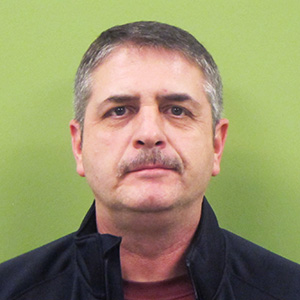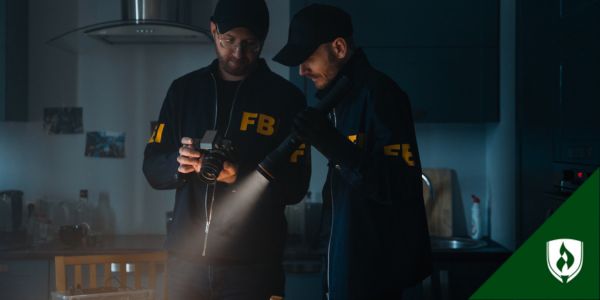Twin Cities Marine Corps Vet Tackles New Frontier in Criminal Justice Program
By Will Erstad on 08/08/2014

Twin Cities criminal justice student Anthony Kapets never thought he’d go to college. In fact, he says the idea seemed downright preposterous, admitting that he was far from a model student in high school. But years later, after two stints in the military, Kapets is now on the front lines of a college education.
Here is how one U.S. Marine Corps veteran navigated the previously unthinkable world of higher education.
Military experience sparks change
College was never really on the horizon for Kapets. He enlisted in the U.S. Marine Corps in 1978 after graduating from high school. He remembers thinking maybe he was missing out on college and other life experiences while he was in the military, but after returning home to Michigan he quickly realized otherwise.
“I realized that the only thing that had changed after coming home was me,” Kapets says.
He returned to find that his old friends were still more interested in partying than anything else—something that had lost its appeal to Kapets. After a few years in his hometown in the Upper Peninsula of Michigan, he and his wife made the move to the Twin Cities in 1986.
While their new life in Minnesota was going well, Kapets missed the camaraderie he experienced during his time in the military. To remedy that, he re-enlisted as a member of the U.S. Marine Corps Reserve in 1990. He originally envisioned his time in the reserves as one weekend a month during which he’d hang out with the guys and have a little fun, but those plans changed drastically.
“I didn’t realize there’d be a freakin’ war going on after joining so I was pretty surprised when I got the call telling me I was going to Saudi Arabia,” Kapets says.
Fortunately for Kapets, the United States’ first foray into Iraq wasn’t a lengthy one. He completed his time in the Reserves without incident but that’s not to say his time in the military wasn’t personally eventful. He developed a passion for learning new things during his training, which made him wonder if he might be cut out for college after all.
That curiosity, however, would be postponed for years.
Finally finding a fit
Kapets returned to civilian life by working a few years in odd jobs in Minnesota. His wife convinced him to meet with a representative from theDepartment of Veterans Affairs (VA) to inquire if he was eligible for any educational benefits but he was denied after completing his interview.
Kapets, who still wasn’t sold on going to college, shrugged off the news and returned to the blue collar work he’d done all of his life. Finally, after the years of physical labor began to take a toll on his body, he agreed to one more interview with the VA about his eligibility for educational benefits. Kapets says he fully expected to be rejected again and was already preparing to break the news to his wife. But that conversation never happened.
“When they asked when I wanted to start [school] I thought to myself ‘Aww man, really?’” Kapets says.
His newfound eligibility for VA benefits was great news for his wife, but Kapets admits the realities of becoming a college student had him very nervous. He needed to find a school where he would feel as comfortable as possible to help combat his nerves. He visited a few colleges around the area, including the University of Minnesota, but found the campus and atmosphere of larger schools to be overwhelming. His visit to Rasmussen College’s Blaine campus, however, made him feel right at home. Kapets says his small-town upbringing fit perfectly with the atmosphere found at the campus.
“The campus was just cozy and comfortable; it was almost like it was made especially for me,” Kapets says. “Everybody was very welcoming and made me feel at ease and that made a huge impact on me.”
Back in action
The comfort Kapets felt with Rasmussen College convinced him to enroll in the criminal justice program in 2010, but it didn’t alleviate all of his worries.
“The first day of school, I remember having almost an anxiety attack in the parking lot—I didn’t want to walk through the doors,” Kapets says. “I thought college was a young kid’s game … but after I walked in and looked around I realized there were more people my age here than I ever imagined.”
Realizing he wasn’t the only non-traditional college kid on campus helped Kapets feel at home. He says he even began to spend more time on campus outside of class to study. Before he knew it, he found himself interested and immersed in subjects he never thought twice about prior to attending college.
“Some of the books we covered were things I’d never even think to crack open—it was like ‘Shakespeare? Are you kidding me?’—but as soon as we got into it I realized the guy is a genius and it was really interesting,” Kapets says.
Kapets’ newfound appreciation for artists like Shakespeare and Rembrandt, as well as his general success in school, can be traced back to his time in the military.
“Without a doubt my time in the military helped me with school,” Kapets says. “It’s kind of a cliché but it helped with the discipline and just taking pride in yourself and what you are doing.”
Beyond his humanities courses, Kapets says he really enjoys the fact that his criminal justice courses are taught by law enforcement officers with plenty of real world experience. One course instructor brought in photos of real crime scenes and had students apply what they’ve learned about crime scene investigation to piece together what they thought happened.
“It was just really interesting to try and figure out—it was like you were really there doing CSI-type work,” Kapets says.
Next steps
Kapets’ success in the classroom led to him earning an associate degree in criminal justice and he hopes to earn a bachelor’s degree by the end of 2015. He credits his wife for giving him the initial push he needed to attend college and continuing to support him throughout his journey.
“She was without a doubt my biggest motivator—if I would’ve listened to myself I would have freaked myself out,” Kapets says. “She’s sacrificed, supported me and has been my best friend through it all—she’s just a wonderful person.”
Kapets hopes to pay back the sacrifice and support of his wife by landing a job in one of the several criminal justice careers available to him when he graduates. While college might not necessarily be strictly a ‘young person’s game’, many law enforcement officer positions do have an age limit. As Kapets puts it, “I’m basically too old to carry a gun.” But that doesn’t close the door on a career in the field. He hopes to one day work in a mission support role for a federal agency like Immigration and Customs Enforcement or the Bureau of Alcohol, Tobacco and Firearms.
Earn your degree
Don’t think for a second that it’s too late to pursue a college education. It doesn’t take years of military experience to possess the discipline and determination necessary to be a successful student—Kapets’ military training simply brought out and refined what was already in his personality.
So what’s stopping you? If you’re ready to find out more about your options for returning to school, click the red ‘Request Program Info’ button at the top of the page to get in touch with an admissions representative.




